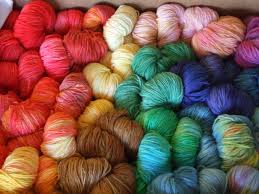中文词源
yarn 纱线
来自PIE*ghere,肠,肠线,词源同chord,cord,hernia.引申词义纱线。比较catgut.
英语词源
- yarn
-
yarn: [OE] Yarn comes from prehistoric Germanic *garn-, which also produced German, Swedish, and Danish garn and Dutch garen. This in turn went back to an Indo-European base whose other descendants include Greek khordé ‘string’ (source of English chord, cord). The sailors’ expression spin a yarn ‘tell a story’ led in the 19th century to the use of yarn for ‘story, tale’.
=> chord, cord - yarn (n.)
- Old English gearn "spun fiber, spun wool," from Proto-Germanic *garnan (cognates: Old Norse, Old High German, German garn, Middle Dutch gaern, Dutch garen "yarn"), from PIE root *ghere- "intestine, gut, entrail" (cognates: Old Norse gorn "gut," Sanskrit hira "vein; entrails," Latin hernia "rupture," Greek khorde "intestine, gut-string," Lithuanian zarna "gut"). The phrase to spin a yarn "to tell a story" is first attested 1812, from a sailors' expression, on notion of telling stories while engaged in sedentary work such as yarn-twisting.
权威例句
- 1. Craft Resources also sells yarn and embroidery floss.
- 工艺人员服务公司也售卖纱线和绣花丝线。
- 2. His grandmother spun him a yarn at the fire.
- 他奶奶在火炉边给他讲故事.
- 3. Don't give me some cooked - up yarn!
- 不要讲编造的故事给我听!
- 4. I stopped to have a yarn with him.
- 我停下来跟他聊天.
- 5. Men yarn of the harbour's famous pilots.
- 人们常讲该港口的一些著名领港员的故事.

